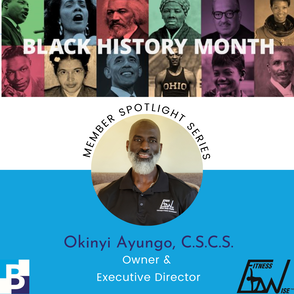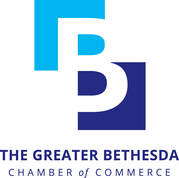 February is Black History Month. While The Greater Bethesda Chamber of Commerce celebrates all our members throughout the year, this month we are shinning a spotlight on our members within the African American community. Join us all month long for our 2nd annual spotlight series. This special feature helps our communities learn a little more about some of their business leaders who work so hard to make it a community to be proud of. Today, we would like you to get to know Okinyi Ayungo of FitnessWise. Okinyi Ayungo, C.S.C.S., is the Owner and Executive Director of FitnessWise™. He is a graduate of the University of Pennsylvania. He is a Certified Strength and Conditioning Specialist with the National Strength & Conditioning Association (NSCA), a Certified Functional Movement Screen (FMS) Specialist, a Certified CrossFit Level I Coach, and a USA Track and Field Level 1 Coach. In his 24 years as a health professional, Okinyi has served as a consultant to the Montgomery County Road Runners, several local sports teams, and athletes of all ages and abilities. Okinyi has also developed functional training programs and educated other fitness professionals in major health clubs. In leading the FitnessWise Team, Okinyi specializes in using functional exercise modalities to help clients recover from injuries move better and improve their quality of life. Since 1992, FitnessWise mission has been to deliver innovative and practical services that improve the way people approach health and fitness. FitnessWise™ and the FitnessWise Team are advisors to healthy and post-rehabilitative children, adults, seniors and athletes and their medical professionals. They help parents help their children learn healthy habits. The team helps older adults learn how to improve their quality of life. And help everyone in between. We asked Okinyi three important questions. Read his responses below. Q1. What are some challenges you faced early on that helped prepare you for the role you are in today and how did you overcome them? One of the biggest challenges that I faced was expectation. Being a son of immigrants (from Trinidad and Kenya) to the United States, growing up there was a major emphasis on education and an expectation that to be "most successful" one had to become a doctor or a lawyer. Since I loved science and sports as a kid, the expectation was that I would become a doctor. Those expectations led to a good educational foundation in biology, physiology, and neuroscience. But what ultimately led me to my career path was numerous athletic injuries in high school and college. I was fascinated with how therapeutic and rehabilitative exercise could help people improve strength and movement ability. It allowed me to continue doing the sports that I loved. And I wanted to help other people improve their quality of life in similar ways. However, I had to overcome the fear of "giving up" on the family expectations of becoming a doctor to "just" become a personal trainer. 25 years ago, the image of personal trainers was primarily "meat heads". The fitness industry was overly consumed with body building and aesthetics. So, I had to seek out mentors who approached exercise from a scientific perspective. I had to learn how to apply principles of human physiology, neuroscience, and psychology to exercise. I had to learn how to meld my interests and follow my passion. And I had to teach my family that making people healthier through exercise and keeping them from having to go to the doctor is just as important as what a doctor does. It took some courage. But thankfully, I had friends and a wonderful wife that supported my decisions and allowed me to take a leap of faith and follow my passion. Q2. Who/What is your biggest inspiration in both your personal and professional life? My mother is my biggest inspiration. She is an "uneducated", country girl from an island in the Caribbean. But she is the smartest person I know. She is a thinker and a problem solver. And, being a single mother, she had to solve a lot of problems on her own. She instilled common sense, adaptability, and ingenuity in all three of her sons. As a small business owner, I do not believe that there is a task that we cannot figure out. I try to have the same approach in raising our three children and in community work. Q3. What is your biggest piece of advice to businesses struggling with diversity and inclusivity in the workplace? If you want something to change, then you must change something. To change to type of candidates that you recruit, you may need to change where you are recruiting from. There is an abundance of talented people from many different backgrounds in our area. But you and the people in charge of hiring will need to step out of the "comfort zone" that you are used to. You will need to present at job fairs that you don't normally do, and you will need to get in front of people that you don't normally do. To promote inclusivity in the workplace, create an environment where people can get to know each other outside of business. When most people talk to one another for more than a few minutes, they learn that they really have more in common than their differences. If you are the boss or executive, this may mean getting out of the office and having genuine interactions with people in the workplace. When people realize their commonalities, they are more likely to see another person's perspective, not judge him/her/them, and care about how day-to-day things affect people and how they feel.
0 Comments
Your comment will be posted after it is approved.
Leave a Reply. |
Welcome!Our Chamber Blog is designed to provide you information about The Chamber, our members, advocacy and legislative updates, and important business tools. Archives
June 2024
Categories
All
|
|

 RSS Feed
RSS Feed

